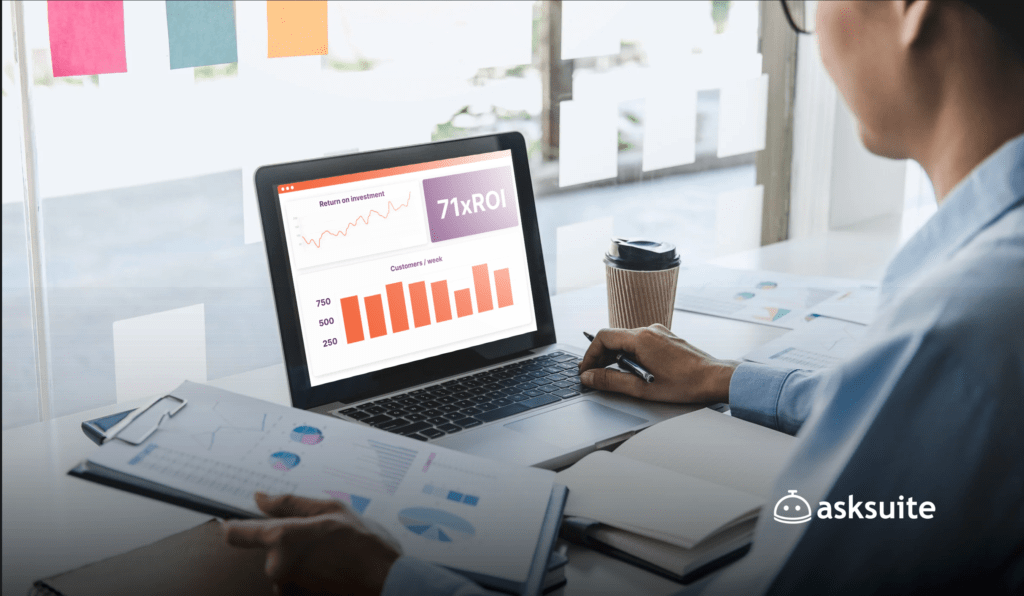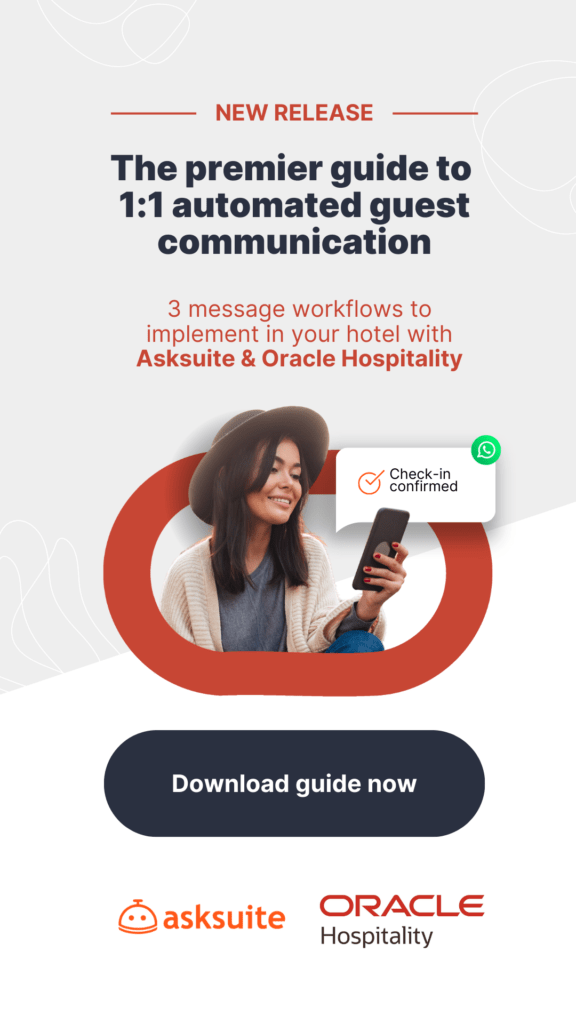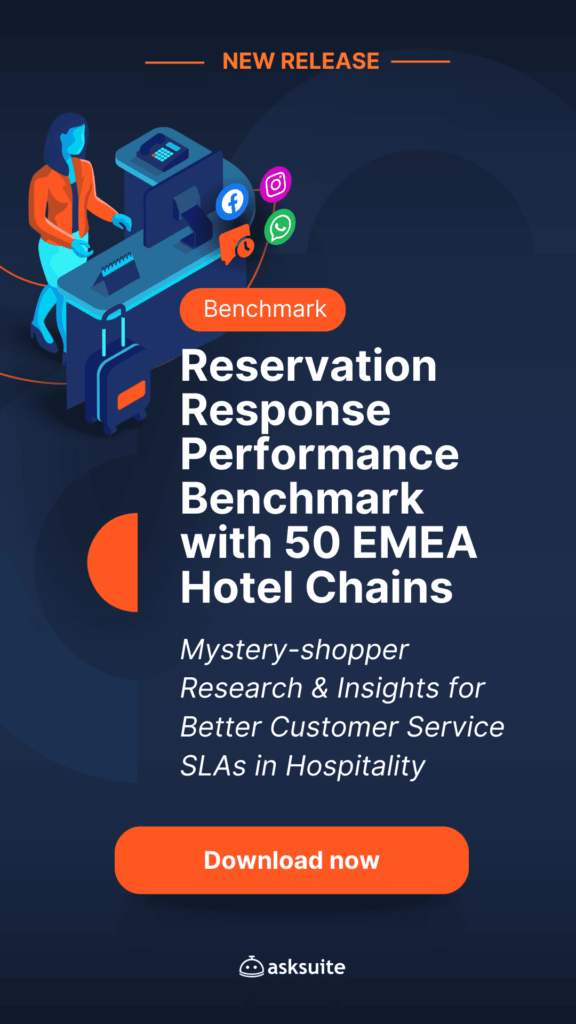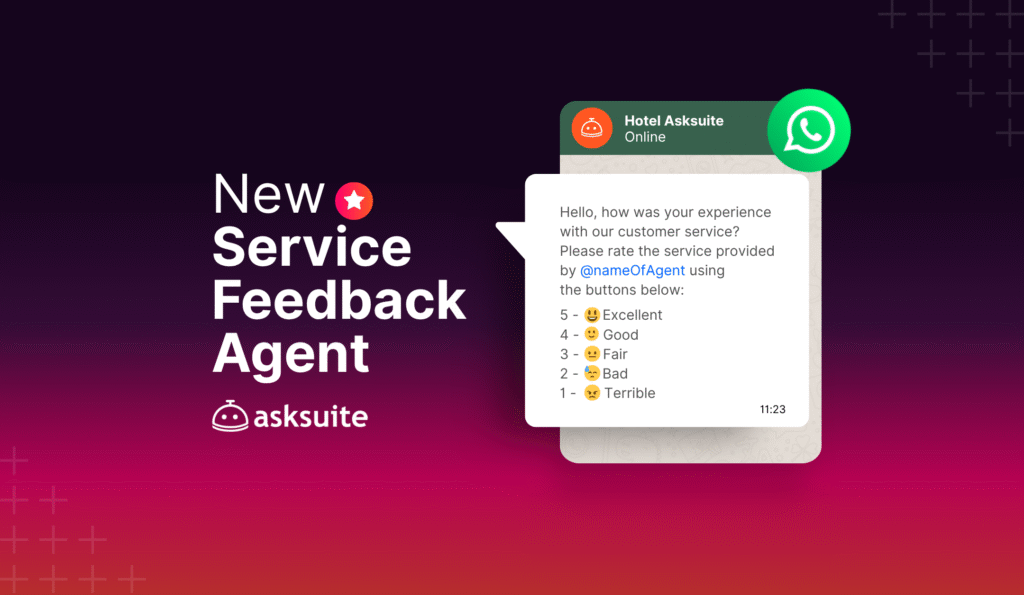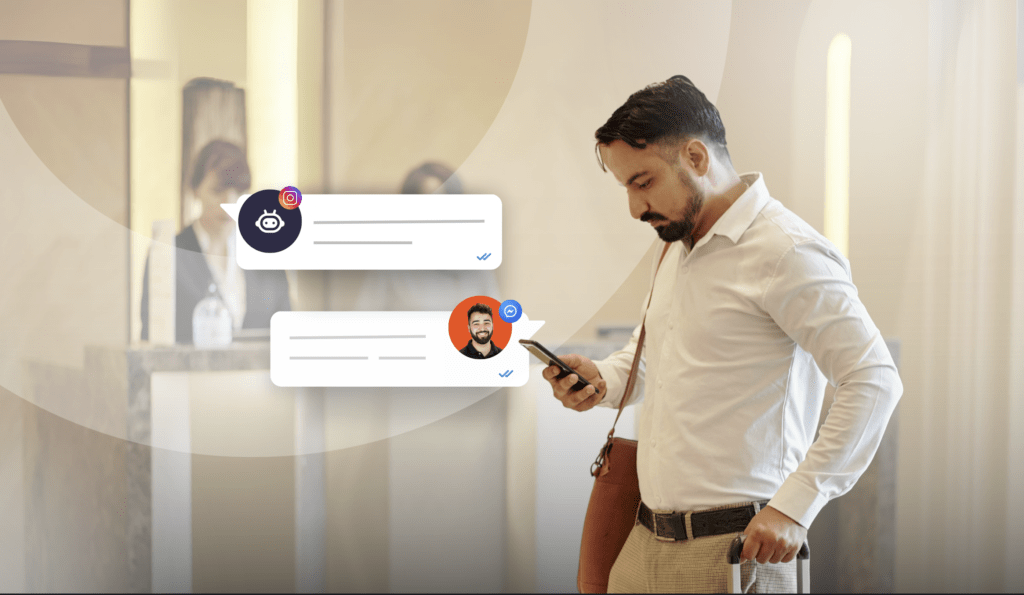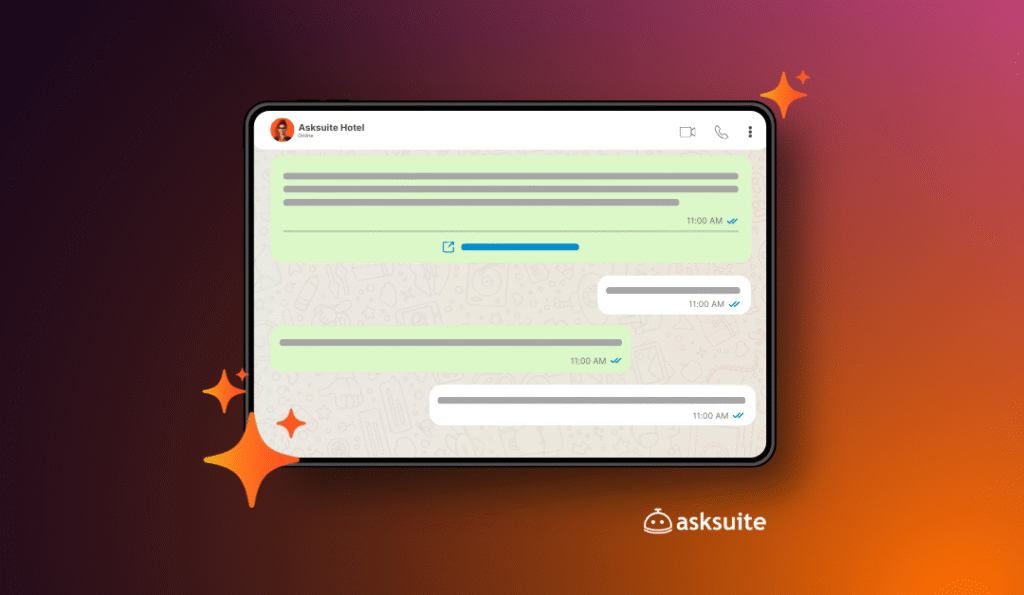Hotel KPIs (Key Performance Indicators) are measurable metrics used to evaluate and track the performance and success of various aspects of hotel operations. These indicators provide valuable insights into areas such as revenue management, guest satisfaction, operational efficiency, and market competitiveness.
Do you know what hotel KPIs (key performance indicators) you should focus on to sell more rooms while providing excellent service?
Even though many hotel Sales & Reservations, Marketing, and General Managers alike agree about price quotes, it can be difficult to decide which metrics to follow. This decision-making can be tricky and subjective as it involves service quality.
However, there are metrics that can show you the path to service excellence. Choosing the right KPIs is critical to ensuring sales increase and optimizing your hotel’s operations. Also, it provides a clear view of the hotel’s progress.
Could you identify your best sales agent? You might answer “yes”, after all, you control the number of sales each month. But is the number of sales enough to accurately measure and manage your team’s performance?
Once you know which metrics to monitor and track, you can make better-informed decisions to help your sales & reservation teams excel and improve results both in customer satisfaction and revenue growth.
KPIs are important for setting team and individual goals. Knowing how they are performing, you can then recognize or even create commission/ bonus plans to keep them highly motivated.
In this article, you will learn about the 6 main KPIs for hotel sales & reservation performance:
1. Sales conversion rate per agent
2. Total service volume per agent
3. First response time per agent
4. Sales Cycle
5. Operational inefficiency rate
6. Average ticket
But before we continue, let’s define high performance in sales and reservations and how the availability of your team can impact your results.
What makes high-performing sales and reservation teams?
In a highly competitive industry, there’s no time to waste. That means your team must convert every opportunity that comes their way into a booking. Each reservation or new account matters.
A high-performing team is one that keeps an eye on every stage of the sales funnel, in both B2C and B2B businesses. Managers along with their teams must be data-driven and strive for daily improvements.
But how do you determine whether your team is performing well? Who is your best agent? The KPIs will provide you with the right answer. If you overlook tracking, your analysis might be flawed.
Here is one example of how the right KPI is key in team evaluations.
Let’s say that one of your agents sold $50,000 in the previous month, and another one sold $40,000. Who performed better?
The correct answer is that it depends on their conversion rates. The first agent might have made 1,000 calls that month and sold 5 reservations of $10,000 each. While the second agent only made 100 calls that same month and converted 20% of the calls, making a total sale of $40,000
In this scenario, you may have noticed that although the first agent sold more, he/she had to spend more time and work harder on the leads than the second one. So, does that mean the second one is better?
Again, it depends! We need more data to accurately evaluate their performance, including, for example, the type of leads they are working with.
In a nutshell, there are many factors to take into account when determining the performance of your sales and reservation teams. But what definitely makes a high-performing team is focusing on KPIs to measure, control, and improve results.
Availability vs. Demand
If you think that the busiest hours for your reservation department to answer booking inquiries is during business hours, you better think twice.
According to Asksuite’s data of 23 million chats from over 2,000 hotels in the world, most travelers contact hotels outside business hours:
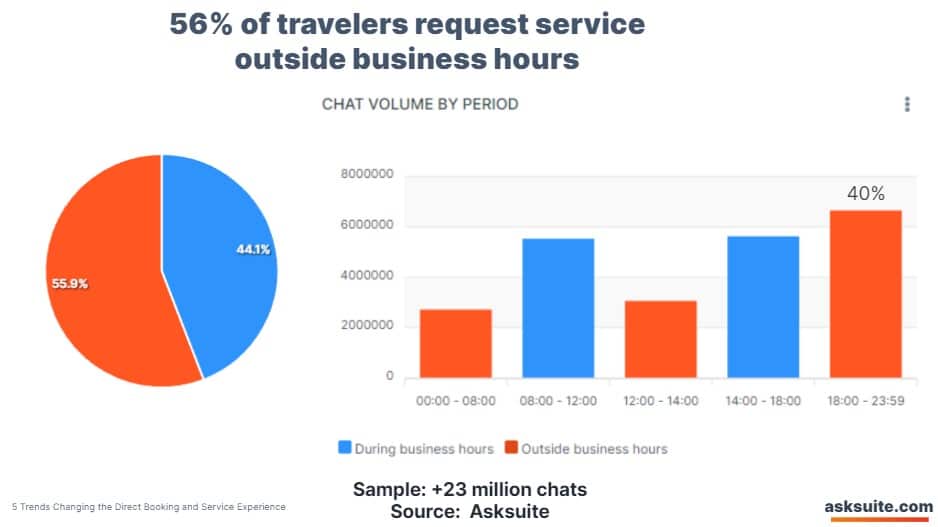
It’s important to track this indicator because it will directly impact your operation and revenue. If your customer service is not available during weekends or outside business hours, chances are you’ll miss out on bookings.
People like to be confident before making a reservation and, often, this reassurance comes from good customer service.
However, providing customer service 24/7 might be costly. According to Forrester Research and Oracle, a web self-service can reduce costs by as much as $11 per call.
That’s why you should consider options other than human assistance, such as AI Reservation Agents. They work all day, every day, for a fraction of the cost and can answer the questions that are stopping travelers from pressing the “book now” button.
6 main hotel KPIs in the hospitality industry
1. Sales conversion rate per agent
If there is one KPI any sales and reservation teams should track is the conversion rate per agent. If you don’t know how your team is performing at an individual level, you won’t be able to improve your results. This is one of the most difficult KPIs to measure, yet one of the most significant to know.
Surprisingly, according to our survey of 124 hotels around the world, over 35% answered that they don’t know what their sales conversion rate per agent is.
On the other hand, 25% of respondents said that their sales conversion rate per agent is 30% or more.
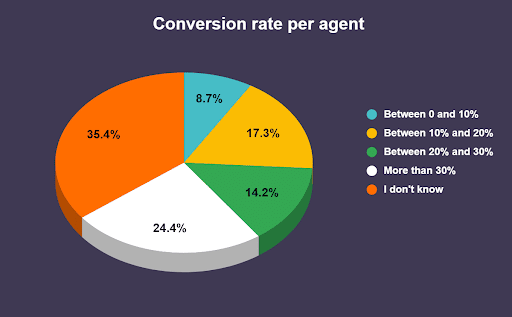
As we stated at the beginning of this article, you can’t improve what you don’t measure. Team performance evaluations are crucial to optimize results.
Also, this KPI might give you valuable insight into your Sales and Reservation operations. Are you assigning the right person to the right demand?
As we already covered in the post “How to Provide the Best Customer Service in the Hotel Industry Before Booking”, segmenting your team into different groups according to the types of demands will help you improve your results.
If a conversion rate is too low, it might be related to a bad combination of demand and agent. So, make sure you assign the best team member to assist in that particular request.
Another tip for when your sales conversion rate per agent is too low is to start working with commissions and/or bonuses if you’re not already doing so. Define your team’s goals and provide this extra incentive.
Here are a few examples of sales KPIs to ensure team engagement:
- Reservation team: % of direct booking conversions ( i.e.,leisure)
- Sales team: Number of new accounts
- Front-desk: Number of walk-ins
If you create a commission program that involves different sectors, you maximize the chances of increasing revenue. Just make sure that you are clear about how the program works and that everybody understands it.
Level up: Booking conversion rate per channel
Knowing which channel brings you more qualified leads enables you to prepare your Reservation Team more effectively and concentrate on converting bookings.
On average, a hotel’s online conversion rate is 2.2%. If you combine your booking engine with a chatbot, your rate can go up by 15%. Asksuite has clients with a conversion rate of more than 20%!
Tracking the conversion rate per channel will give you important insight into how you should organize your operations in order to maximize your reservations.
2. Total service volume per agent
“A chain is only as strong as the weakest link”.
This means that a group can only be as successful as its least successful or powerful person. If one person fails, the whole group fails.
This is one of the reasons why you need to monitor this KPI. This metric talks about your team’s productivity. How many people does each agent interact with daily? Monthly?
It will give you perspective into how your team is spending their time. Are they taking care of customers or doing operational work that could be automated?
Therefore, this sales and reservation KPI does not consider what type of service or demand your agents are most focused on. In other words, you don’t know if they are answering 20 simple questions (sometimes from travelers that have already booked with you) or 20 room quotations that can lead to hotel bookings.
In a survey that we conducted with 86 hotels globally, 58% of hotels reported that they answer 30-80 emails daily on average and 24% answer 80-120 emails per day.
Also, 43% of hotels claim that they spend too much time answering the same questions.
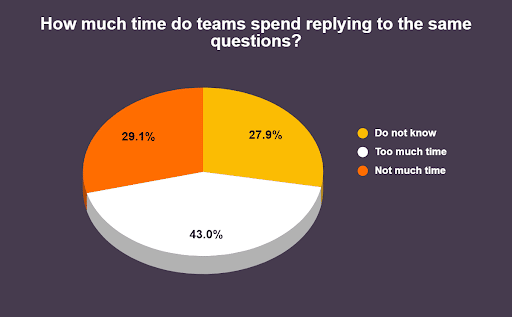
As you can see, even if the volume of service is high, that doesn’t mean that your team is being productive or efficient.
Level up: Total service volume per channel
Knowing the volume of service per agent is crucial if you want to build high-performing sales and reservations teams. Another KPI that can impact your results is the total volume of service per channel.
Why? Because once you know which channels are attracting more bookings, you can optimize your operations, so any chance of conversion is not wasted.
So, you need to ask yourself:
Which channel is the most used by your guests and potential guests?
Long gone are the days when telephone and emails were the only way to contact a hotel. Even though they are still relevant, there are many other ways available for travelers to get in touch with a place that they are interested in. For example, chat and text messaging are becoming increasingly common.
Despite popular belief, instant messages are trendy in every generation, not only among the young ones. The pandemic contributed to the acceleration of the digitalization process in all industries, including the hospitality industry.
Today, everyone – from teenagers to grandparents- uses text messaging to order food, car rides, talk to family, and so on. Some of the most popular ways to talk to companies include Website Chat, WhatsApp, and Instagram.
The graphic below represents the chat volume per channel in hotels on average based on our data provided from 2,000 hotels. When a hotel offers multiple channels, we can see that website chats are preferred.
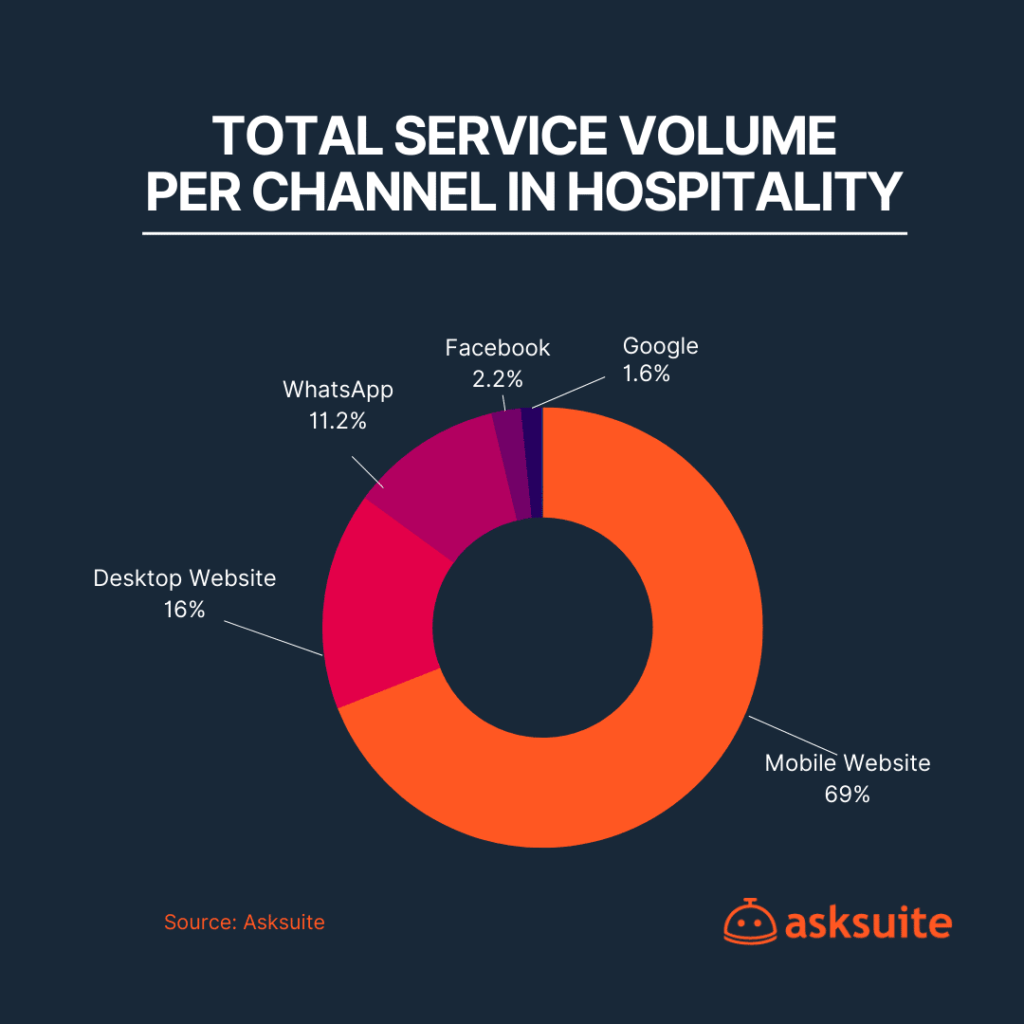
This data is vital for customer service. Once you know the preferred channel of your potential guest, you can better prepare operations and your team, so you don’t lose potential customers.
2. First response time (FRT) per agent
Another key factor that impacts the quality of hotel customer service and guest satisfaction is response time. In a fast-paced world, there is simply no time to waste waiting for an answer.
Particularly important to convert assistance into bookings is the first response. First response time (FRT) is the duration of time from when a customer first submits their inquiry to when an agent responds to it.
There are technological tools, such as Asksuite, that can provide you with this information.
Before we get into detail about FRT, we must discuss another key concept all Sales and Reservations teams should know: SLA. A service-level agreement (SLA) is a contract between a service provider and its customers that documents the services provided and defines the standards they’re obligated to meet.
SLA is important because it helps manage expectations and defines the severity levels and circumstances under which they’re not liable for outages or performance issues.
Average response time per channel
It’s also vital to track the response time in different channels, so you can identify your operational deficit.
Calls
When it comes to phone calls, Askuite has asked 124 hotels about their average response times :
- 15% of respondents answered they didn’t know.
- 30% said they took more than 2 minutes to start talking to the caller.
Emails
Regarding emails, a survey, this time by ALICE, states that hotel clients would have the right to complain if the hotel takes more than 26 minutes to respond.
In our survey conducted in 2022 with 86 hotels, 46.6% of respondents stated that they take up to one hour to answer an email.
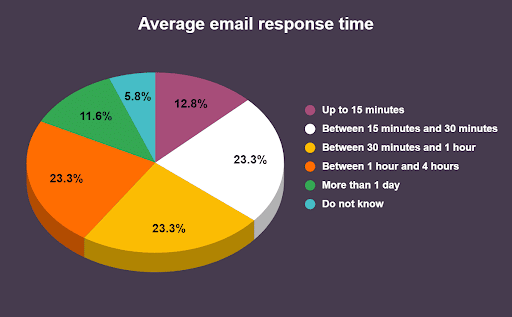
As you can see, most hotels don’t meet customer expectations. Providing good and fast service will put your business ahead of the game. Time is everything!
Messaging Apps
Messaging apps have created an expectation of quick responses, which has made it even harder for hotels.
Travelers want fast and easy answers. But how fast?
When we talk about chats, the expectation is even higher. According to SuperOffice, 9 minutes is too long:
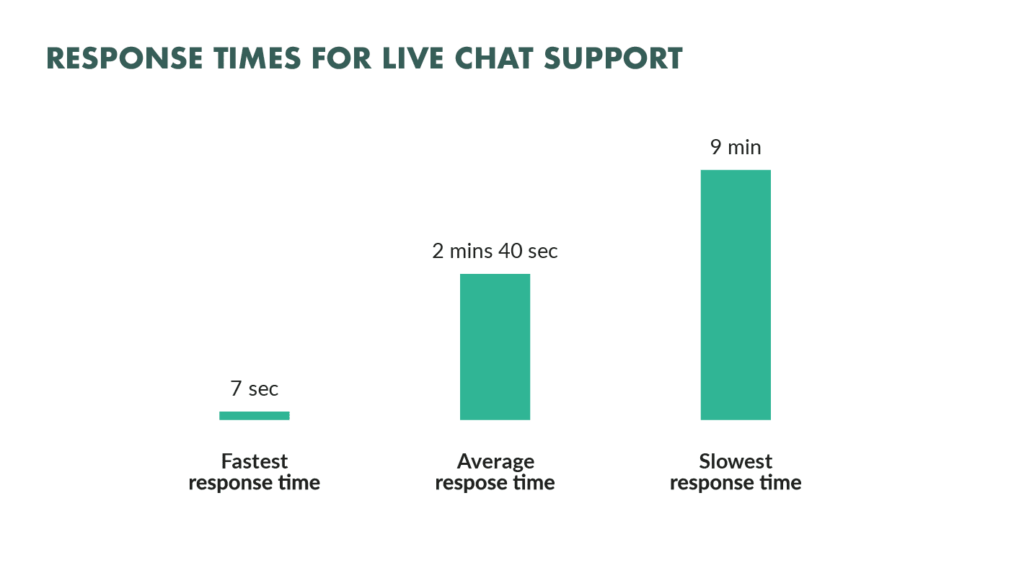
Social media
Long gone are the days when social media was restricted to marketing. Today, people search and contact hotels through different social media platforms.
Having an online presence is not enough. You need to provide customer service where your potential guests are.
In our survey of 86 hotels, almost 40% of them answered that they take up to one hour to respond to a DM.
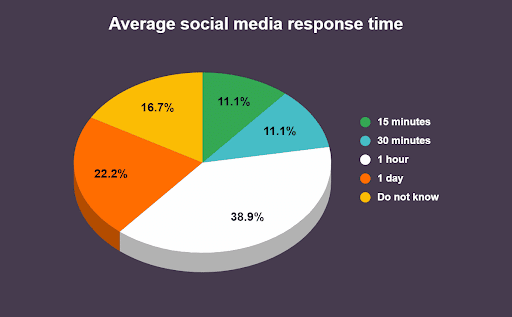
It wasn’t clear if they provide the service on the platform or if they ask customers to contact them through another channel, for example by email. Hopefully, they don’t ask travelers to change channels, since it’s not a recommended practice in customer service.
How to improve your first response time?
AI Reservation Agents can be a great resource for your team. Such tech tool gives the user the experience they expect, providing interactions in real-time. They also help users find what they are looking for, increasing the chances of booking and returning.
A human agent takes several minutes to carry out a full guest service. On the other hand, an automated customer service powered by Artificial Intelligence takes only a few seconds to give a thorough answer, with pictures and prices.
Besides adopting technology, you can also improve your FRT by providing effective training. Proper training can ensure your agents are up-to-date on the processes followed during and after services. Training will give a boost to your team’s efficiency.
4. Sales cycle
The sales cycle is the process that companies undergo when selling a product to customers. It encompasses the time from receiving the first request/question to closing a deal.
Understanding your sales cycle will assure you that your sales and reservation processes are efficient. It provides insights into your operations and possible gaps you might have. It also gives you clues on whether your team is really focusing on sales.
A CRM or an omnichannel service platform like Asksuite can provide hotels with this sales and reservation KPI.
The average sales cycle of our 2,000 clients among hotels, resorts, and inns was 8 hours and 2 min. On the other hand, one of the resorts that we work with has a sales cycle of 1 day, 4 hours, and 21 minutes. As you can see, the type of accommodation can surely impact the sales cycle.
But, besides the length of your sales cycle, it’s also crucial to identify the number of touches (active and passive) that happen during the entire negotiation process. This way, you can spot where your agent is spending the most time and figure out strategies that might shorten your sales cycle.
If you’re looking for a solution to help you with these metrics, we’ll be happy to show you what our platform can do for you. Book a demo now and see how it works:
5. Operational Efficiency rate:
The operational efficiency rate is defined by how efficient your business is at minimizing costs while generating income. Whereas, the operational inefficiency rate in hotels can be defined by the time your team is not selling.
.
You can have a good idea of how inefficient your process is by dividing the total number of customer services by the number of services that include bookings or sales.
Ideally, your sales and reservation teams should focus on selling rooms and generating revenue, at least 80% of the time. When a customer already has a reservation with your hotel, they should be assisted by front desk agents.
This sales and reservations KPI is very important to track, but it can be hard to measure. It requires categorizing the types of demands to assign the right person to the right service.
6. Average ticket
Selling rooms is an important part of being a good sales and reservations agent. But maximizing hotel revenue in each sale is what differentiates the good from the excellent agents.
Average ticket is a metric that provides details on the average amount of sales per agent. Learning how to optimize sales is a key ability that your team should train. Upselling and cross-selling can significantly impact your profitability for sales and reservation teams to get the best out of every deal.
Mastering these strategies will increase your average ticket. Your team can get more profit with less effort. Perfect!
A good starting point here is to know your customers. The more you know them, the better you’ll be able to offer the right product or service to the right person That way, selling extras gets that much easier.
However, besides training your staff, one crucial aspect is to ensure that customers know what options are available and how simple it is to purchase them. Make sure your products and services can be easily obtained in their channel of choice (emails, calls, messaging apps, and so on).
How to manage hotel KPIs?
When you look at sales and reservation KPIs, you might think that tracking and managing these indicators is a “mission impossible.” Indeed, it can be hard to do this manually.
However, there are hotel technologies that can help you on this quest. Here are the two main ones available:
- PMS: Through the Property Management System (PMS), hotels can track which agents closed reservations, the number of reservations per agent, and more. There are many PMS types, with different functionalities and possibilities to collect important data to understand your hotel’s performance and guests’ behavior.
- Communication and service platform: platforms like Asksuite can automatically generate performance reports including conversion rates per channel and agent. More than that, this platform makes it easy to control customer service since it centralizes interactions from different channels on one screen.
There’s no such thing as good hotel management if you can’t measure and control your KPIs. Without them, it’s impossible to improve.
Plus, KPIs also enable you to motivate and recognize your team’s results. Here at Asksuite, for example, we follow KPIs and always celebrate with monthly happy hours when we achieve both individual and team goals.
Moreover, by measuring your sales and reservation KPIs, you can identify your strengths and weaknesses, as well as use this to your property’s advantage. Once you completely understand your sales and reservation process and potential gaps, you can then achieve a maximum conversion rate from service to booking.
Click on the button below and find out how our solution can help you boost your sales and reservation performances:
